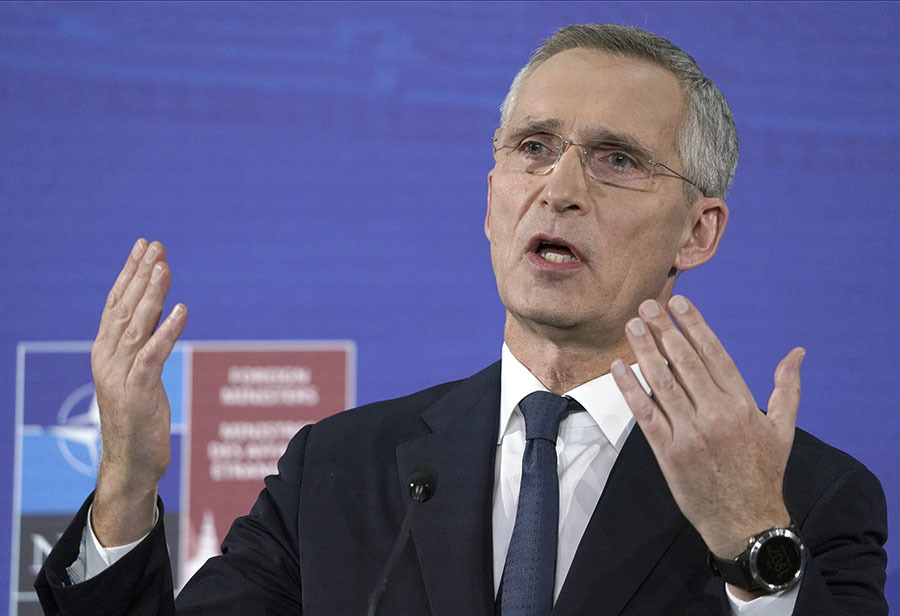NATO Secretary General Jens Stoltenberg has spoken out against holding a spheres of influence conference with Russia.
He stated this in an interview with the Journal de Dimanche.
According to the alliance secretary general, such a meeting would be a "step backward" for NATO.
“The idea of holding a new conference, where we would again discuss the zones of influence, within which the great powers could control what their neighbors can or cannot do, would be a step back for us, and this is not at all the right direction”, - said Stoltenberg.
At the same time, the head of the alliance stated the need to conduct a dialogue with the Russian side, in particular, to strengthen confidence between Moscow and NATO.
In addition, Stoltenberg opposed Russia on the alliance's refusal to provide military assistance to Ukraine, which contains the Moscow-proposed Security Assurance Treaty.
He said that the alliance's decision to provide assistance to Kiev is related to the alleged accumulation of forces on Russian territory along the border with Ukraine, and also said that in the event of Russia's aggression against Ukraine against Moscow, economic and political sanctions would be adopted.
AP
© Roman Koksarov
Sergei Tsekov, a member of the Federation Council Committee on Foreign Affairs, in a conversation with RT, stressed that NATO "continues its anti-Russian course."
According to him, the alliance does not understand that it is not only about security for Russia, but also for Europe and the entire world community.
“Stoltenberg generally acts like a NATO hawk.
In principle, he torpedoes any proposal and any possibility of defusing tensions between NATO and Russia.
He constantly blames Russia.
He is completely incapable of objectively assessing NATO's actions, ”the senator said.
According to Tsekov, Stoltenberg, in particular, is unable to appreciate the hardships experienced by the people of Ukraine and which were created "with the very direct participation of NATO."
“Stoltenberg is the NATO Secretary General, but there are also countries that are members of the alliance, there are leading countries.
If they say that it is necessary to conduct a dialogue and agree with what Russia is proposing, with all the proposals or with some of them, then this will be exactly the dialogue we are counting on, ”the senator said.
In turn, Alexander Domrin, professor at the Faculty of Law at the Higher School of Economics, in an interview with RT, also drew attention to Stoltenberg's Russophobic position, which manifests itself all the time that he is NATO Secretary General.
“This is a man who did everything to ensure that relations between NATO and Russia were worse than they could have been.
In general, the NATO secretary general is to a large extent a technical position, and policy is largely shaped by the US representative to NATO.
Until we have received a response from Washington to the Russian proposals, it seems to me unlikely to expect any changes with the departure of Stoltenberg and the arrival of someone else, "the expert concluded.
On December 17, the Russian Foreign Ministry announced the draft treaty with the United States and a security agreement with NATO, which were transferred to the American side.
The first document contains a proposal for interaction between Moscow and Washington on the principle of "indivisible and equal security", and also excludes the use of the territory of third countries for the preparation or implementation of an armed attack against the other party to the treaty.
The agreement on security measures for Russia and NATO member states stipulates that the parties do not strengthen their security "at the expense of the security of others."
According to this document, Russia and the alliance must confirm that they do not consider each other opponents, and NATO members must abandon any military activity on the territory of Ukraine, as well as a number of other countries.
Russian Deputy Foreign Minister Alexander Grushko called on NATO countries to take Moscow's proposals on security guarantees seriously, noting that otherwise the alliance would have to deal with a military-technical alternative.
“We will strive to achieve very consistently and fundamentally the implementation of the vision of how to build European security, exactly as we formulated it,” he said.
According to him, Moscow, in its proposals, signaled its readiness to talk about translating the military scenario of confrontation into a political process that would strengthen the security of all OSCE countries, Euro-Atlantic and Eurasia.
Grushko added that Russia has sufficient technical capabilities to ensure its own military security.
At the same time, the Russian ambassador to the United States, Anatoly Antonov, noted that Washington's rhetoric about Moscow's allegedly "aggressive" plans with regard to Ukraine has no basis and "is nothing more than propaganda."
“Let me remind you that Russia has every right to freely move its troops on its own territory and conduct training events.
We do not threaten anyone, ”Antonov emphasized.

